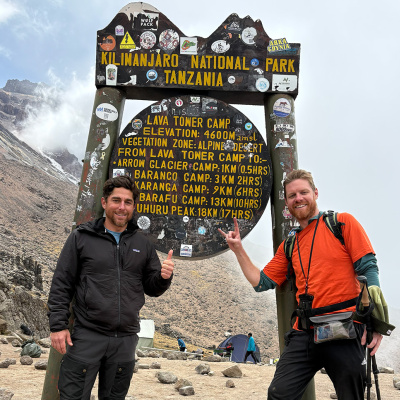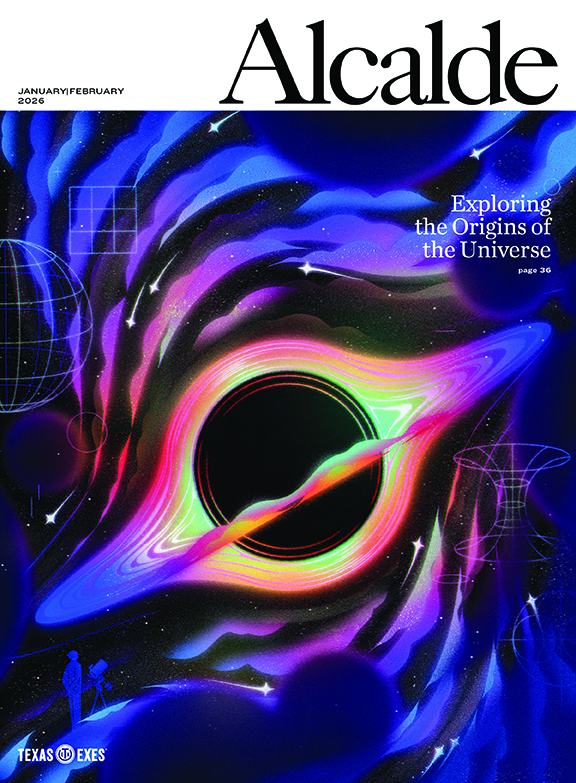The Play's the Thing
After 400 years, we still have much to learn from Shakespeare. In an educational climate focused on buzzwords like efficiency, STEM, and MOOCs, one UT scholar reminds us of the Bard’s power.

People who fancy themselves more serious than their neighbors—and there’s a lot of them out there—like to say that higher education needs more teaching of subjects that will actually help students in their careers, and less research into things that don’t matter. But what, in particular, doesn’t matter? William Shakespeare, for starters. As though channeling Malvolio, Twelfth Night’s puritanical busybody, critics of American universities have found the enemy, and it looks a lot like research on the Bard.
Seemingly impractical, Shakespeare is, like the humanities themselves, a hard sell to backers of STEM. For the uninitiated, that acronym stands for science, technology, engineering, and math, the four horsemen of a brave new world that Shakespeare’s audiences at The Tempest—where the phrase “brave new world” was first heard—couldn’t have foreseen. Our lives, as well as our machines, are more complicated than ever. Why shouldn’t higher education reflect that complexity by paying more attention to what’s made it all possible?
Some may view the move toward STEM as a laudable enthusiasm for science, much like the U.S. exhibited after Sputnik. Replace the Russians with the Chinese, however, and you quickly see the difference. People promoting STEM subjects rarely mention grand goals like space exploration or national defense. Instead, STEM is about money, and the careers that produce it. Other subjects are not only useless distractions, but also a drain on resources. When teaching the humanities seems frivolous, paying people to conduct research into such subjects is downright unfathomable.
Shakespeare became the poster child of inefficiency in April 2011, when the Texas Tribune published an opinion piece by Ronald Trowbridge, a senior fellow at the Texas Public Policy Foundation. Criticizing research in the humanities, Trowbridge claimed that from 1980 to 2006, there were 21,674 articles published on Shakespeare, and asked, in a question that seemed to answer itself, “Do we need the 21,675th?”
Now, these figures happened to be wrong, for Trowbridge underestimated the number of articles by several thousand. But this accounting error didn’t diminish his rhetorical flourish. Too much of anything is too much, and a mound of Shakespeare articles seems a poor investment for taxpayers. Wouldn’t we be better off if professors turned full-time to teaching? Don’t we already know enough about Shakespeare, the battle of Gettysburg, and the French language?
As tuition goes up and up, questions like this become more urgent, and not surprisingly, get directed at the scholars with the least power in the university. The liberal arts can’t often take credit for curing disease or producing a better battery. Its subjects—history, language, society, and culture (to name only these)—seem an indulgence rather than a necessity.
Even more to the point, the digital age offers a great deal of access to what’s been discovered about nearly everything. To the alphabet soup of STEM, in fact, proponents of efficiency in higher education have started to champion MOOCs: massive open online courses, or essentially filmed lectures available to the masses. MOOCs strike many as the perfect solution to the rising cost of higher education. More articles on subjects in the humanities seem like a waste of money. Wouldn’t it be a good idea just to record a star professor’s Shakespeare course, using articles already published, and call it quits on research?
Not at all, and for more reasons than can be counted. About Shakespeare, for instance, we know surprisingly little. Even the most basic details of his biography remain sketchy [see sidebar, "10 Things You Didn't Know About Shakespeare"]. We do know that he wrote most of the 40 or so plays and various poems we attribute to him. That’s important to say right away, for there’s a well-established tradition of craziness that claims someone, anyone else—Queen Elizabeth, Francis Bacon, or one of 100 aristocrats—wrote what Shakespeare wrote. The reasons for these strange theories are as complicated as human nature itself, but they’re out there and repeated often enough to need refuting.
To stop studying facts is to open the door to people who misread evidence and assert things that aren’t true. This is as true for “soft” subjects like Shakespeare as it is for topics like evolution, medicine, and global warming. Ignorance doesn’t discriminate, and it often has a lot of energy and money behind it. A university should be dedicated to truth, and the truth about truth is that, while we never see it whole, some people don’t wish to see it at all, and still others want to put falsehoods in its place.

Universities, then, have a custodial relationship to the truth, and even maintenance requires time and labor. But institutions of higher learning have always been about advancing knowledge, not being content with what we know now.
And the humanities offer countless puzzles to be solved. Our knowledge of Shakespeare, again, is too slender. We don’t know enough about his life, friends, patrons, reading, or activities. Despite best-selling books that focus on what he is thought to have done in particular years, we’re not sure when he wrote his various plays and poems. We guess, intelligently, but these are only guesses.
We’re not even certain that we know everything Shakespeare wrote and didn’t write. During the past generation, for example, scholars have come to agree that one of Shakespeare’s strangest plays, Timon of Athens, is odd in part because it is a collaboration between Shakespeare and a younger playwright named Thomas Middleton. Collaboration was common in the theater of his day, and we know that Shakespeare worked with other playwrights, particularly toward the beginning and end of his career.
As his career was passing its peak, for instance, Shakespeare wrote a beautiful play, Pericles, with a man named George Wilkins, and, later, The Two Noble Kinsmen and Henry VIII with John Fletcher. Shakespeare also wrote a play titled Cardenio with Fletcher. We think that it doesn’t survive—or, if parts of it do, they’re not the parts that Shakespeare wrote.
Just how do scholars determine what Shakespeare wrote and what he didn’t? Patterns, to begin with. The assumption, based on many writers’ works, is that we each have tendencies in the way we use language. What kinds of words and phrases we use, the percentage of this kind of pronoun versus that kind of pronoun: these and dozens of other linguistic patterns have helped scholars suss out various authors’ contributions to collaborative works, whether The Two Noble Kinsmen or the Federalist Papers.
The question of who wrote what might not seem the most interesting thing to ask, given a work’s positive qualities. Isn’t it enough that a play has good things in it? How you answer that question depends on your toleration for mysteries: whether you like to solve mysteries, or have them solved—gaining more information, to be sure, but also leading (as these things do) to further mysteries.
“But Shakespeare is esoteric,” you may say. “Give us practical knowledge.” True, Shakespeare can’t cure cancer, or slow global warming. But the kinds of things we learn about life from studying his works—in the library, as well as through performance in a theater—can help us with problems outside the printed page. And it’s extremely difficult to predict where and how that help will be needed. During the two World Wars, for instance, a number of code breakers on the Allied side were literary scholars who had made the study of difficult language their forte. When conflict came, this enabled them to aid the war effort in ways they hadn’t anticipated when studying Beowulf, the Canterbury Tales, and Hamlet.
Some questions from the classroom arise outside it all the time. Authorship, in particular, is always with us. Who wrote this anonymously published note, letter, manifesto, or novel? Who wrote this will, and when? And which draft came first? The kinds of things that scholars have discovered studying the language of literary texts can help with such questions, even when that help comes fairly accidentally.
This is why research—in the humanities and sciences alike—is a good thing. It helps society to have knowledge pushed continually forward. It’s a mistake to think of learning as a finished thing, to be recorded in a frozen form and broadcast efficiently forever after. Like the natural sciences, the humanities are an unfinished project and will remain that way, as Sonnet 18 puts it, “so long as men can breathe, or eyes can see.”
While every field remains a work in progress, the best way to learn any subject is in person, with teachers who participate in discovery. With researchers, that is. For researchers know as well as anyone that yesterday’s version of a subject needs to be challenged, refined, extended, and sometimes overturned.
The creativity that pushed Shakespeare’s pen across the page challenges everyone. Research into his creativity, like research into all challenging subjects, helps develop our imaginations. And imagination remains a key to lifelong success, whether you’re interested in advertising, engineering, architecture, medicine, or business. Because every researcher remains a lifelong student, the ideal classroom is a laboratory of discovery. The skills that students acquire there started yesterday, yet shape the discoveries of tomorrow.
After 400 years, we are still learning more about Shakespeare every day. This is likely to be true four centuries from now, for we’re always playing catch-up with the complexity of his writings. Reading him makes us smarter, and always has. Conducting research into his words, life, and times is a good investment.
Douglas Bruster is the Mody C. Boatright Regents Professor in American and English Literature in UT’s Department of English.
Illustration by Daniel Adel.






